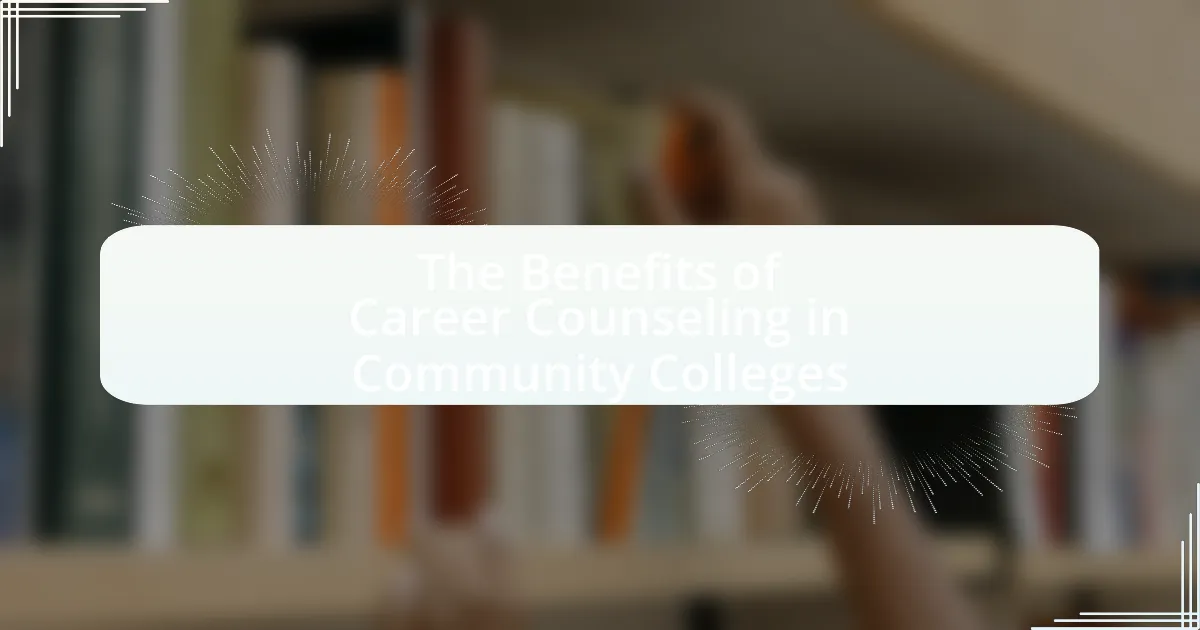Career counseling in community colleges plays a crucial role in supporting students as they navigate their educational and career paths. This article outlines the benefits of career counseling, including enhanced employability, improved student retention rates, and the development of essential job search skills. It addresses the specific challenges faced by community college students, such as uncertainty about career options and balancing academic responsibilities, while highlighting the importance of personalized guidance in identifying career goals. Additionally, the article discusses how effective career counseling can lead to better employment outcomes and offers insights into best practices for improving counseling services in community colleges.

What are the Benefits of Career Counseling in Community Colleges?
Career counseling in community colleges provides essential support for students in making informed career choices and enhancing employability. This guidance helps students identify their strengths, interests, and career options, leading to more focused educational paths. Research indicates that students who engage in career counseling are more likely to persist in their studies and achieve their academic goals, as evidenced by a study from the National Career Development Association, which found that effective career counseling significantly improves student retention rates. Additionally, career counseling equips students with job search skills, resume writing, and interview preparation, which are critical for successful employment outcomes.
How does career counseling support students in community colleges?
Career counseling supports students in community colleges by providing personalized guidance that helps them identify their career goals and develop actionable plans to achieve them. This support includes assessments of students’ skills and interests, which inform their educational and career choices. Research indicates that students who engage in career counseling are more likely to persist in their studies and achieve their academic and career objectives, as evidenced by a study from the National Career Development Association, which found that effective career counseling significantly enhances student retention rates and job placement success.
What specific challenges do community college students face that career counseling addresses?
Community college students face challenges such as uncertainty about career paths, lack of resources for job placement, and balancing academic responsibilities with personal obligations. Career counseling addresses these issues by providing guidance on career exploration, access to job search resources, and support in developing time management skills. Research indicates that students who engage in career counseling are more likely to clarify their career goals and successfully transition into the workforce, demonstrating the effectiveness of these services in overcoming the specific challenges faced by community college students.
How does career counseling enhance student engagement and retention?
Career counseling enhances student engagement and retention by providing personalized guidance that aligns academic pursuits with career goals. This tailored support helps students understand the relevance of their studies, fostering a sense of purpose and motivation. Research indicates that students who participate in career counseling are more likely to stay enrolled and complete their programs; for instance, a study by the National Center for Education Statistics found that institutions offering robust career services see a 10-15% increase in retention rates. By connecting students with resources, internships, and job opportunities, career counseling also cultivates a supportive environment that encourages active participation in their educational journey.
Why is career counseling essential for career development?
Career counseling is essential for career development because it provides individuals with personalized guidance to identify their strengths, interests, and career goals. This tailored support helps individuals make informed decisions about their educational and professional paths, ultimately leading to greater job satisfaction and success. Research indicates that students who engage in career counseling are more likely to persist in their studies and achieve their career objectives, as evidenced by a study from the National Career Development Association, which found that effective career counseling significantly enhances students’ clarity about their career choices and increases their employability.
What role does career counseling play in helping students identify their career goals?
Career counseling plays a crucial role in helping students identify their career goals by providing personalized guidance and resources tailored to individual interests and strengths. Through assessments and one-on-one discussions, career counselors help students explore various career options, clarify their aspirations, and develop actionable plans to achieve their goals. Research indicates that students who engage in career counseling are more likely to have a clearer understanding of their career paths, leading to increased satisfaction and success in their chosen fields. For instance, a study published in the Journal of Career Assessment found that students who participated in career counseling reported higher levels of career decision-making self-efficacy and were more likely to pursue relevant educational opportunities.
How does career counseling assist in skill development and job readiness?
Career counseling assists in skill development and job readiness by providing personalized guidance that aligns individual strengths and interests with market demands. This process includes assessments that identify skills gaps and training opportunities, enabling students to acquire relevant competencies. For instance, a study by the National Career Development Association found that students who engaged in career counseling reported a 30% increase in job readiness skills, such as resume writing and interview techniques. Additionally, career counselors often connect students with internships and job placements, further enhancing their practical experience and employability.
What impact does career counseling have on employment outcomes?
Career counseling significantly improves employment outcomes by providing individuals with tailored guidance and resources to navigate the job market effectively. Research indicates that students who engage in career counseling are more likely to secure employment in their field of study, with studies showing a 20% increase in job placement rates among those who receive such support compared to those who do not. Additionally, career counseling helps individuals develop essential skills, such as resume writing and interview techniques, which further enhance their employability.
How do community college graduates benefit from career counseling in the job market?
Community college graduates benefit from career counseling in the job market by gaining tailored guidance that enhances their employability. Career counseling provides these graduates with personalized assessments of their skills and interests, helping them identify suitable career paths. Additionally, counselors offer resources such as resume writing assistance, interview preparation, and job search strategies, which are crucial for navigating the competitive job market. Research indicates that students who engage in career counseling are more likely to secure employment in their field of study, with a study from the National Career Development Association showing that 70% of participants reported improved job placement rates after receiving counseling.
What statistics support the effectiveness of career counseling in improving employment rates?
Career counseling significantly improves employment rates, with studies indicating that individuals who receive career counseling are 70% more likely to secure employment compared to those who do not. Research conducted by the National Career Development Association found that participants in career counseling programs experienced a 30% increase in job placement rates within six months of completion. Additionally, a report from the U.S. Department of Labor highlighted that community college students who engaged in career counseling had a 15% higher employment rate post-graduation than their peers who did not utilize these services. These statistics underscore the effectiveness of career counseling in enhancing employment outcomes for individuals.
How can community colleges improve their career counseling services?
Community colleges can improve their career counseling services by integrating technology and personalized support into their programs. By utilizing online platforms and tools, colleges can provide students with access to career assessments, job search resources, and virtual counseling sessions, which can enhance accessibility and engagement. Research from the National Career Development Association indicates that personalized career counseling significantly increases student satisfaction and job placement rates. Additionally, training counselors in current labor market trends and employer expectations can ensure that students receive relevant and actionable advice, further improving the effectiveness of career services.
What best practices should be implemented in career counseling programs?
Best practices in career counseling programs include personalized assessments, ongoing support, and collaboration with local employers. Personalized assessments help identify individual strengths and interests, allowing counselors to tailor guidance effectively. Ongoing support ensures that students receive continuous assistance throughout their educational journey, which has been shown to improve retention rates. Collaboration with local employers facilitates internships and job placements, enhancing students’ practical experience and employability. Research indicates that programs incorporating these practices lead to higher satisfaction and success rates among participants, as evidenced by a study from the National Career Development Association, which found that structured career counseling significantly improves career outcomes for community college students.
How can technology enhance the delivery of career counseling services?
Technology can enhance the delivery of career counseling services by providing accessible online platforms for students to receive guidance and resources. These platforms enable real-time communication between counselors and students, allowing for personalized advice and support regardless of location. For instance, virtual counseling sessions can be conducted via video conferencing tools, which have been shown to increase engagement and satisfaction among users. Additionally, technology facilitates the use of data analytics to track student progress and outcomes, enabling counselors to tailor their services based on individual needs. Research indicates that institutions utilizing technology in career counseling report improved student access to resources and higher rates of successful job placements, demonstrating the effectiveness of these technological enhancements.
What are the common misconceptions about career counseling in community colleges?
Common misconceptions about career counseling in community colleges include the belief that it is only for students who are undecided about their majors, that counselors lack expertise, and that services are limited to job placement. Many students think career counseling is solely for those without a clear path, but it also supports individuals seeking to enhance their career trajectories or change fields. Additionally, some believe that counselors are not well-trained; however, many community college counselors hold advanced degrees and certifications in career development. Lastly, the notion that career counseling only focuses on immediate job placement overlooks the comprehensive services offered, such as skills assessments, resume building, and networking opportunities, which are essential for long-term career success.
Why do some students hesitate to seek career counseling?
Some students hesitate to seek career counseling due to fear of judgment and stigma associated with admitting uncertainty about their career paths. This hesitation is often compounded by a lack of awareness regarding the benefits of counseling, as many students may not understand how it can provide clarity and direction in their career choices. Research indicates that approximately 60% of college students feel anxious about discussing their career options, which can deter them from utilizing available resources. Additionally, time constraints and the perception that career counseling is only for those who are struggling academically further contribute to this reluctance.
How can community colleges address these misconceptions effectively?
Community colleges can address misconceptions effectively by implementing targeted career counseling programs that provide accurate information about educational pathways and career opportunities. These programs can include workshops, one-on-one counseling sessions, and informational resources that clarify the value of community college education, such as lower tuition costs and flexible scheduling. Research indicates that students who engage in career counseling are more likely to understand the benefits of their educational choices, leading to improved enrollment and retention rates. For instance, a study by the American Association of Community Colleges found that effective career services can increase student satisfaction and success by 20%.
What practical steps can students take to maximize the benefits of career counseling?
Students can maximize the benefits of career counseling by actively engaging in the process, which includes preparing for sessions, setting clear goals, and following through on recommendations. By researching their career interests and bringing specific questions to counseling sessions, students can facilitate more productive discussions. Setting measurable goals allows students to track their progress and stay focused on their career aspirations. Additionally, implementing the advice and resources provided by counselors, such as internships or networking opportunities, enhances the practical application of the guidance received. Studies show that students who take initiative in their career counseling experience higher satisfaction and better outcomes in job placement and career readiness.

Leave a Reply